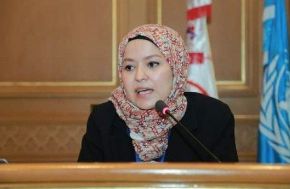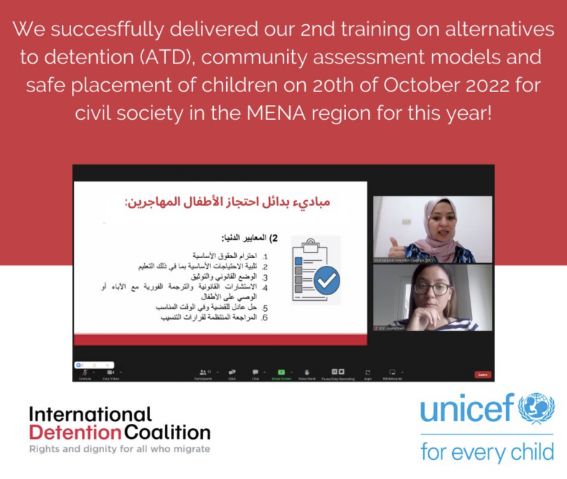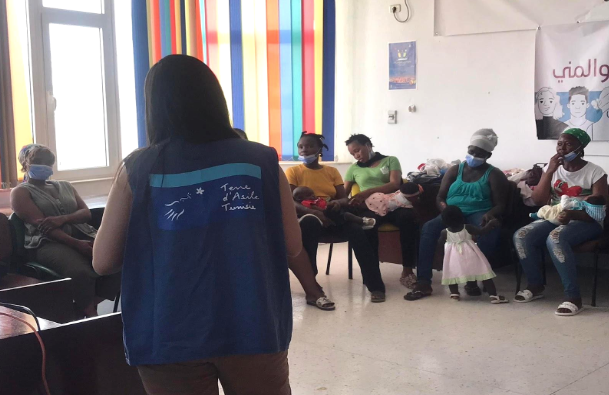IDC’s MENA Regional Coordinator Amera Markous recently presented at the the 7th edition of the Summer School on Migration in Tunisia, organised by IOM Tunisia in partnership with the National Institute of Labor and Social Studies (INTES) in September 2022. The forum’s theme was “Children and Migration,” and IDC provided a comprehensive introduction to alternative care options for migrant children, and presented several examples of alternatives to detention (ATD) from the Middle East and North Africa (MENA) region, as well as from other regions. The video recording of IDC’s intervention is available here in Arabic.

The presentation focused on the impacts of detention on children, such as the severe harm to children’s physical and mental health, and overall wellbeing. IDC also reminded the audience that detention is never in the best interest of the child, as per the Convention on the Rights of the Child (CRC). IDC MENA Regional Coordinator explained the positive impacts of ATD, based on evidence and research carried out by IDC across different parts of the world. Additionally, Amera highlighted promising practices towards ending child immigration detention, which reflect the role of the governments, legislators, civil society, UN agencies and local communities including leaders with lived experience in creating whole-of-society and whole-of-government implementation of ATD that can protect and uphold the rights of migrant and refugee children. Such examples are featured in IDC’s recent report: Gaining Ground: Promising Practice to Reduce & End Immigration Detention.
Capacity Building for Civil Society in MENA
In partnership with UNICEF, IDC organised an online ATD training on 20 October 2022. The training focused on screening, assessment, referral mechanisms of children, as well as case management and community placement options for children. IDC believes that these critical elements serve as a framework for identifying and developing rights-based ATD. This training aims to strengthen the capacity of civil society organisations, as well as bring together a network of actors working in the field of ending child immigration detention across the region.
Our training was attended by 50 participants working on issues related to refugee and migrant children from more than 10 countries in the MENA region. Continue to follow us for future updates!

An Interview with IDC Member: Terre D’asile Tunisia
IDC aims to highlight the critical and important work to end immigration detention being implemented by civil society actors in the MENA region. IDC’s MENA Programme recently interviewed Sherifa Riahi, Country Director of Terre D’asile Tunisia to share insights on these efforts in the region.
Terre D’asile Tunisia was founded in 2012 in Tunisia as a section of Terre d’Asile France. Its mission is to enhance social cohesion and protection, and promote the rights of migrants, refugees, people seeking asylum, unaccompanied minors, and human trafficking survivors living in Tunisia.
Challenges facing migrants and refugees in Tunisia
Sherifa explained that the arbitrary arrest and detention of refugees continues from time to time. Further, there are discriminatory practices based on skin color, ethnicity, social class and language. In addition to arbitrary detention, the lack of a case management system makes the situation more challenging. There is no proper identification of trafficked persons to ensure appropriate care, or proper age assessment of children to ensure referral to child protection authorities.
Interpretation services are severely limited, which means that migrants are not provided with information about their rights, detention, or complex migration processes in languages that they understand. Additionally, Tunisia does not finance deportation processes, and so those facing deportation must expense their own return.
The work of Terre D’Asile and other civil society organisations
Tunisian civil society works to support migrants and refugees facing these concerning conditions and situations. Terre D’asile Tunisia plays an important role in implementing different support mechanisms throughout people’s experience in Tunisia. Terre D’asile Tunisia provides legal support to people in detention, including legal consultations, reporting mistreatment to public institutions, and particularly supports the detention cases of trafficking survivors and children. Terre D’asile Tunisia also provides social assistance to those who are detained, through the delivery of essential items, such as hygiene kits.

Key highlights in the past period
- Terre d’Asile Tunisia is part of a Working Group on Arbitrary Detention, alongside Organisation Mondiale Contre la Torture (OMCT), Avocats Sans Frontieres (ASF) and Forum Tunisien pour les Droits Economiques et Sociaux (FTDES). This Working Group has recently been able to secure the release of more than 25 people from detention in Tunisia.
- Terre d’asile Tunisia is currently establishing a new day care center for migrant and Tunisian children in vulnerable situations which will be operating in January 2023. The organisation leads this project, and uses a case management approach to provide tailored support that responds directly to children’s needs. An initial reception and needs assessment is completed, followed by a response plan addressing the most urgent needs, as well as long-term support for the development of their lives and futures.
Socio-economic Crises, Deportations & Deaths at the Eastern Mediterranean Route
The current economic crisis in Lebanon – alongside an ongoing political and health crisis – is driving hundreds of people to risk crossing the Mediterranean Sea in order to seek safety in Europe, though multiple sources insist that estimates could be in thousands. UNHCR states that the number of people who left Lebanon by sea nearly doubled between 2020 and 2021, and “the figure rose again by more than 70% in 2022….fuelled by Lebanon’s financial collapse as poverty rates have soared among the population of 6.5 million.” Such movements have also been driven by growing discrimination and resentment towards refugee communities in Lebanon and Turkey. In September, 94 people, including 10 children, drowned off the coast of Syria when a boat carrying 150 people departed Lebanon. In another case, a boat carrying 250 people departed Lebanon for Italy, and was stranded at sea for a week without food or water until being rescued by an NGO ship. On another stranded vessel, a four year old girl from Syria, Loujin, died of thirst while waiting to be rescued in September.
As people are struggling to survive these journeys to safety, Lebanon announced a plan to return 15,000 Syrian refugees every month to Syria, and Turkey is proposing to deport 1 million people to Northern Syria through daily deportations. However, voluntary returns from Lebanon are not a new phenomenon and they have commenced even before now, with various sources stating that upward of 21,000 Syrians have been returned to Syria already before the process was halted in 2020 due to COVID-19 – although the government insists that these are voluntary returns, however, there are many concerns on this.
UNHCR reports that at least 71,771 Syrian refugees have returned voluntarily from Lebanon since 2016 up until August 2022, some through government-organised trips and some on their own. Though Lebanon has begun with the Syrians who wish to return voluntarily, there is no reassurance that forced returns will not be taking place. As per the country’s Minister of the displaced, returns will continue beyond those who wish to return voluntarily, amid insistence that Syria is now safe, as the Syrian government is now welcoming Syrian refugees back to the country. However, refugees, as well as human rights groups such as Human Rights Watch, Amnesty International and other UN Agencies such as UNHCR, are concerned about the conditions of these returns. Reports by human rights organizations have cited cases of returning refugees disappearing and getting detained and tortured. Even more alarming, is the fact that the Lebanese government has excluded UNHCR from this process. Therefore, amid these realities, boats from Lebanon continue to leave the coast headed towards Europe in order to search for safety and seek protection.
At IDC, we believe that forced reparations deny freedom and asylum to people who may face persecution upon their return, and also further exacerbate the risk of immigration detention for those seeking safety and peace. IDC supports our allies working to secure safe and legal routes for people to migrate, which end the tragic loss of life occurring in the Mediterranean Sea.
This section was developed in collaboration with Dr. Jasmin Lilian Diab, Director of the Institute for Migration Studies and Assistant Professor of Migration Studies, Lebanese American University
Border Controls & Externalisation of the Asylum System
In addition to the critical situation inside detention centres in Libya, including ongoing human rights violations, the interception and forced return of people who are trying to cross the Mediterranean Sea to Europe is frequently reported (read our previous newsletter for more details). According to IOM’s Libya Maritime update, as of September 2022, a total of 16,506 migrants have been arrested and returned back to Libyan shores to date this year, 546 of whom were minors.
There are fears rising amongst activists that Italy will apply stricter border controls, deny people the right to seek asylum, and may plan reforms to offshore the entire asylum process to third countries. Further, a report indicates that this offshore approach might include strengthening the 2017 Italy-Libya agreement, and exploring similar agreements with other North African countries. In IDC’s experience, agreements that forcibly intercept and return people on the move, as well as offshore processing arrangements, can lead to further erosion of rights and increased risk of immigration detention for many.
IDC asks European States to adhere to their obligations under international law, and ensure that no more lives are lost at sea and that people’s liberty and rights are upheld as they seek safety and protection in Europe.
Written by Asma Nairi IDC MENA Programme Officer & Amera Markous IDC MENA Regional Coordinator